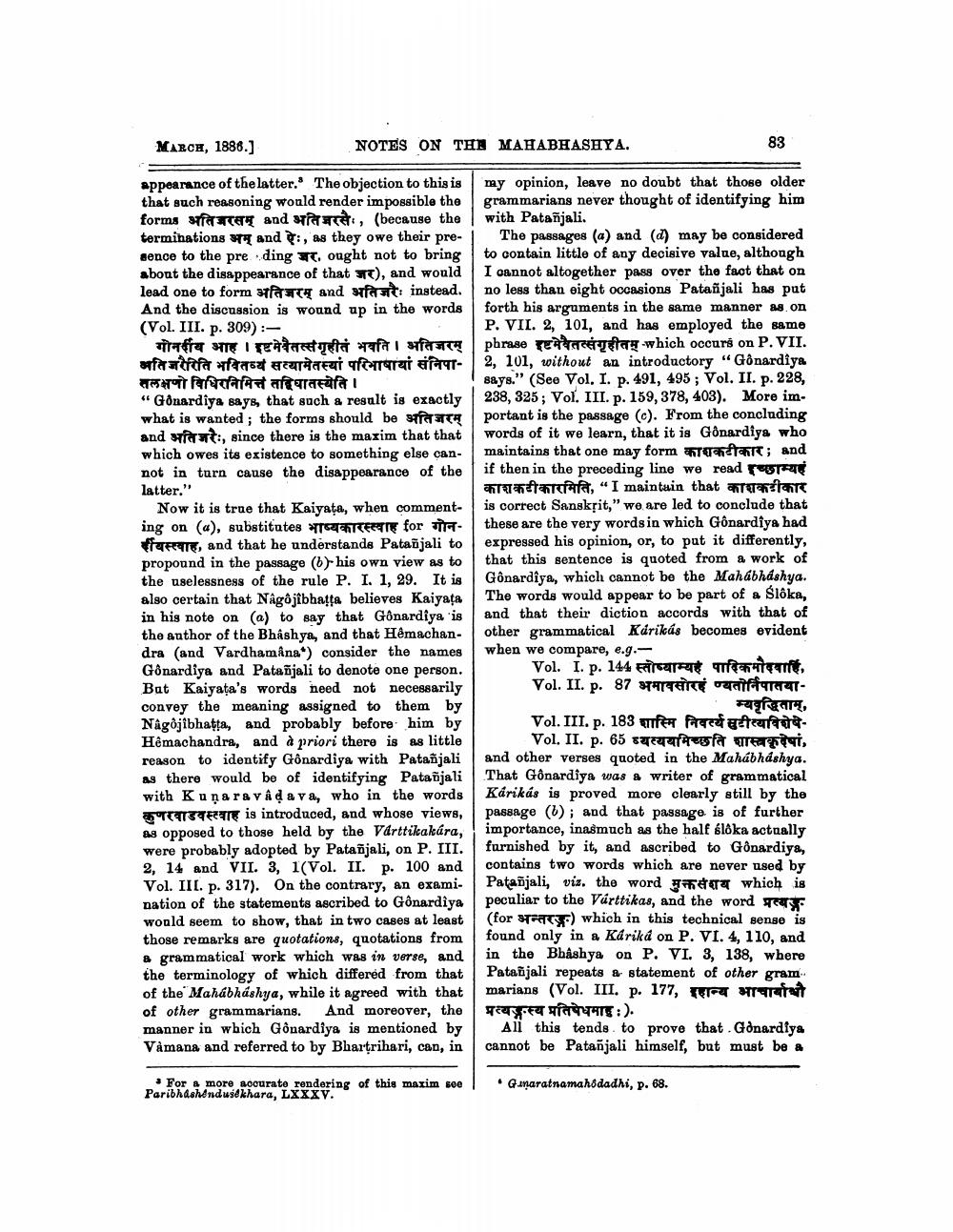________________
NOTES ON THE MAHABHASHYA.
MARCH, 1886.]
appearance of the latter. The objection to this is that such reasoning would render impossible the forms अतिजरसम् and अतिजरसै, (because the terminations and :, as they owe their presence to the preding. ought not to bring about the disappearance of that ), and would lead one to form अतिजरम् and अतिजरे: instead. And the discussion is wound up in the words (Vol. III. p. 309):
गोदय आह । इष्टमेवैतत्स गृहीतं भवति । अतिजरम् अतिजरैरिति भवितव्यं सत्यामेतस्यां परिभाषायां संनिपातलक्षणो विधिरनिमित्तं तद्विघातस्येति । "Gonardiya says, that such a result is exactly what is wanted; the forms should be a and art, since there is the maxim that that which owes its existence to something else cannot in turn cause the disappearance of the latter."
Now it is true that Kaiyata, when commenting on (a), substitutes भाष्यकारस्त्वाह for गोनयस्त्वाह, and that he understands Patañjali to propound in the passage (b) his own view as to the uselessness of the rule P. I. 1, 29. It is also certain that Nagôjîbhatta believes Kaiyata in his note on (a) to say that Gônardiya is the author of the Bhashya, and that Hemachandra (and Vardhamâna) consider the names Gônardiya and Patanjali to denote one person. But Kaiyata's words need not necessarily convey the meaning assigned to them by Nagojibhatta, and probably before him by Hêmachandra, and à priori there is as little reason to identify Gônardiya with Patanjali as there would be of identifying Patanjali with Kunaravaḍava, who in the words कुणरवाडवस्त्वाह is introduced, and whose views, as opposed to those held by the Varttikakára, were probably adopted by Patanjali, on P. III. 2, 14 and VII. 3, 1(Vol. II. p. 100 and Vol. III. p. 317). On the contrary, an examination of the statements ascribed to Gônardiya would seem to show, that in two cases at least those remarks are quotations, quotations from a grammatical work which was in verse, and the terminology of which differed from that of the Mahabhashya, while it agreed with that of other grammarians. And moreover, the manner in which Gônardiya is mentioned by Vamana and referred to by Bhartrihari, can, in
For a more accurate rendering of this maxim see Paribhashendusekhara, LXXXV.
83
my opinion, leave no doubt that those older grammarians never thought of identifying him with Patanjali.
The passages (a) and (d) may be considered to contain little of any decisive value, although I cannot altogether pass over the fact that on no less than eight occasions Patanjali has put forth his arguments in the same manner as on P. VII. 2, 101, and has employed the same phrase इष्टमेवैतत्संगृहीतम् which occurs on P. VII. 2, 101, without an introductory "Gônardiya says." (See Vol. I. p. 491, 495; Vol. II. p. 228, 238, 325; Vol. III. p. 159, 378, 403). More important is the passage (c). From the concluding words of it we learn, that it is Gônardiya who maintains that one may form काशकटीकार; and if then in the preceding line we read काशकटीकारमिति, “ I maintain that काशकडीकार is correct Sanskrit," we are led to conclude that these are the very words in which Gônardiya had expressed his opinion, or, to put it differently, that this sentence is quoted from a work of Gônardiya, which cannot be the Mahábháshya. The words would appear to be part of a Ślôka, and that their diction accords with that of other grammatical Kárikás becomes evident when we compare, e.g.
Vol. I. p. 144 स्तोष्याम्यहं पारिकमौदवार्हि, Vol. II. p. 87 अमावसोरहं ण्यतोर्निपातयाम्यताम्, Vol. III. p. 183 शास्मि निवर्त्य मुदीव्यविशेषेVol. II. p. 65 saftesia areatai, and other verses quoted in the Mahabháshya. That Gônardiya was a writer of grammatical Kárikás is proved more clearly still by the passage (b); and that passage is of further importance, inasmuch as the half ślôka actually furnished by it, and ascribed to Gônardiya, contains two words which are never used by Patanjali, viz. the word which is peculiar to the Varttikas, and the word (for ) which in this technical sense is found only in a Káriká on P. VI. 4, 110, and in the Bhashya on P. VI. 3, 138, where Patanjali repeats a statement of other gram. marians (Vol. III. p. 177, aratat प्रत्यङ्गस्य प्रतिषेधमाइ : ).
All this tends to prove that. Gonardiya cannot be Patanjali himself, but must be a
Gunaratnamahôdadhi, p. 68.




